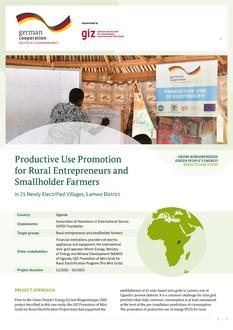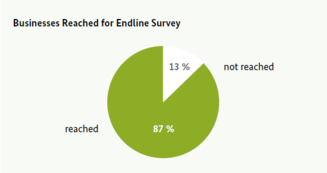Difference between revisions of "Productive Use Promotion for Rural Entrepreneurs & Smallholder Farmers in Uganda"
***** (***** | *****) m Tag: 2017 source edit |
***** (***** | *****) m Tag: 2017 source edit |
||
| Line 16: | Line 16: | ||
The project approach is to train and/or coach up to 150 new or existing rural entrepreneurs and smallholder farmers in entrepreneurial skills and assist them in implementing business development for the productive use of energy. This is complemented by the establishment of a matching grant scheme for the target group to co-finance the purchase of productive use appliances and equipment, and the creation of an enabling environment for improved access to such financial services. The project approach focuses on women in that it tries to foster greater participation of women in the implementation. This is done particularly in the selection of the rural entrepreneurs and smallholder farmers through a business idea competition where emphasis is laid on the selection of women entrepreneurs. The business idea will be assessed against several criteria, one of them the ability to offer equal opportunity to men and women. The training of entrepreneurial skills, coaching, and training of trainers is carried out by experienced local trainers of which 50 % are women. | The project approach is to train and/or coach up to 150 new or existing rural entrepreneurs and smallholder farmers in entrepreneurial skills and assist them in implementing business development for the productive use of energy. This is complemented by the establishment of a matching grant scheme for the target group to co-finance the purchase of productive use appliances and equipment, and the creation of an enabling environment for improved access to such financial services. The project approach focuses on women in that it tries to foster greater participation of women in the implementation. This is done particularly in the selection of the rural entrepreneurs and smallholder farmers through a business idea competition where emphasis is laid on the selection of women entrepreneurs. The business idea will be assessed against several criteria, one of them the ability to offer equal opportunity to men and women. The training of entrepreneurial skills, coaching, and training of trainers is carried out by experienced local trainers of which 50 % are women. | ||
| + | == Methodology of Data Collection == | ||
| + | [[File:Figure 1 Participation in Endline Survey.png|thumb|Figure 1: Participation in Endline Survey|327x327px]] | ||
| + | |||
| + | The data for this case study report was collected through a review of project documents, 5 qualitative interviews with representatives of GIZ, AVSI Foundation, MEMD, Pro Mini Grids, and the mini grid operator: Winch Energy, as well as a quantitative survey in which 145 out of 167 contacted enterprises participated. | ||
Revision as of 13:35, 10 May 2024
Productive Use Promotion for Rural Entrepreneurs & Smallholder Farmers in Uganda
Project Approach
Prior to the Green People’s Energy (Grüne Bürgerenergie, GBE) project described in this case study, the GIZ Promotion of Mini Grids for Rural Electrification Project team had supported the establishment of 25 solar-based mini grids in Lamwo, one of Uganda’s poorest districts. It is a common challenge for mini grid providers that daily customer consumption is at least maintained at the level of the pre-installation predictions of consumption.The promotion of productive use of energy (PUE) for rural entrepreneurs and smallholder farmers is one way to address this challenge, through generating the demand and ability to pay for electricity and thereby also ensuring the sustainability of the mini-grids. Although access to electricity is given, many rural entrepreneurs and smallholder farmers lack the knowledge and skills needed to use effectively energy to improve their businesses and farming practices.
Against this background, the GBE productive use project has two main objectives:
- to increase entrepreneurial skills and competencies of new and existing businesses, and
- to promote the development of start-ups and strengthen existing energy-intensive businesses.
The project approach is to train and/or coach up to 150 new or existing rural entrepreneurs and smallholder farmers in entrepreneurial skills and assist them in implementing business development for the productive use of energy. This is complemented by the establishment of a matching grant scheme for the target group to co-finance the purchase of productive use appliances and equipment, and the creation of an enabling environment for improved access to such financial services. The project approach focuses on women in that it tries to foster greater participation of women in the implementation. This is done particularly in the selection of the rural entrepreneurs and smallholder farmers through a business idea competition where emphasis is laid on the selection of women entrepreneurs. The business idea will be assessed against several criteria, one of them the ability to offer equal opportunity to men and women. The training of entrepreneurial skills, coaching, and training of trainers is carried out by experienced local trainers of which 50 % are women.
Methodology of Data Collection
The data for this case study report was collected through a review of project documents, 5 qualitative interviews with representatives of GIZ, AVSI Foundation, MEMD, Pro Mini Grids, and the mini grid operator: Winch Energy, as well as a quantitative survey in which 145 out of 167 contacted enterprises participated.





















